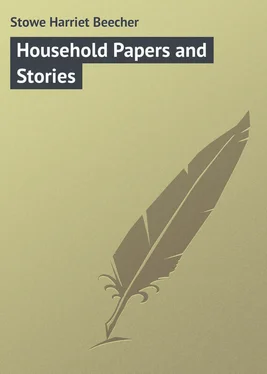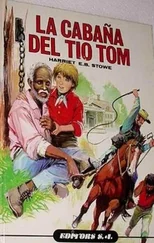Harriet Stowe - Household Papers and Stories
Здесь есть возможность читать онлайн «Harriet Stowe - Household Papers and Stories» — ознакомительный отрывок электронной книги совершенно бесплатно, а после прочтения отрывка купить полную версию. В некоторых случаях можно слушать аудио, скачать через торрент в формате fb2 и присутствует краткое содержание. Жанр: foreign_prose, на английском языке. Описание произведения, (предисловие) а так же отзывы посетителей доступны на портале библиотеки ЛибКат.
- Название:Household Papers and Stories
- Автор:
- Жанр:
- Год:неизвестен
- ISBN:нет данных
- Рейтинг книги:3 / 5. Голосов: 1
-
Избранное:Добавить в избранное
- Отзывы:
-
Ваша оценка:
- 60
- 1
- 2
- 3
- 4
- 5
Household Papers and Stories: краткое содержание, описание и аннотация
Предлагаем к чтению аннотацию, описание, краткое содержание или предисловие (зависит от того, что написал сам автор книги «Household Papers and Stories»). Если вы не нашли необходимую информацию о книге — напишите в комментариях, мы постараемся отыскать её.
Household Papers and Stories — читать онлайн ознакомительный отрывок
Ниже представлен текст книги, разбитый по страницам. Система сохранения места последней прочитанной страницы, позволяет с удобством читать онлайн бесплатно книгу «Household Papers and Stories», без необходимости каждый раз заново искать на чём Вы остановились. Поставьте закладку, и сможете в любой момент перейти на страницу, на которой закончили чтение.
Интервал:
Закладка:
But I have made my article too long. I will write another on the moral and intellectual effects of house-furnishing.
“I have proved my point, Miss Jenny, have I not? In house-furnishing nothing is more economical than beauty. ”
“Yes, papa,” said Jenny; “I give it up.”
V
RAKING UP THE FIRE
We have a custom at our house which we call raking up the fire . That is to say, the last half hour before bedtime, we draw in, shoulder to shoulder, around the last brands and embers of our hearth, which we prick up and brighten, and dispose for a few farewell flickers and glimmers. This is a grand time for discussion. Then we talk over parties, if the young people have been out of an evening, – a book, if we have been reading one; we discuss and analyze characters, – give our views on all subjects, æsthetic, theological, and scientific, in a way most wonderful to hear; and, in fact, we sometimes get so engaged in our discussions that every spark of the fire burns out, and we begin to feel ourselves shivering around the shoulders, before we can remember that it is bedtime.
So, after the reading of my last article, we had a “raking-up talk,” – to wit, Jenny, Marianne, and I, with Bob Stephens: my wife, still busy at her work-basket, sat at the table a little behind us. Jenny, of course, opened the ball in her usual incisive manner.
“But now, papa, after all you say in your piece there, I cannot help feeling that, if I had the taste and the money too, it would be better than the taste alone with no money. I like the nice arrangements and the books and the drawings, but I think all these would appear better still with really elegant furniture.”
“Who doubts that?” said I. “Give me a large tub of gold coin to dip into, and the furnishing and beautifying of a house is a simple affair. The same taste that could make beauty out of cents and dimes could make it more abundantly out of dollars and eagles. But I have been speaking for those who have not and cannot get riches, and who wish to have agreeable houses; and I begin in the outset by saying that beauty is a thing to be respected, reverenced, and devoutly cared for, and then I say that BEAUTY IS CHEAP, – nay, to put it so that the shrewdest Yankee will understand it, – BEAUTY IS THE CHEAPEST THING YOU CAN HAVE, because in many ways it is a substitute for expense. A few vases of flowers in a room, a few blooming, well-kept plants, a few prints framed in fanciful frames of cheap domestic fabric, a statuette, a bracket, an engraving, a pencil-sketch, – above all, a few choice books, – all these arranged by a woman who has the gift in her finger-ends, often produce such an illusion on the mind’s eye that one goes away without once having noticed that the cushion of the armchair was worn out, and that some veneering had fallen off the centre-table.
“I have a friend, a schoolmistress, who lives in a poor little cottage enough, which, let alone of the Graces, might seem mean and sordid, but a few flower-seeds and a little weeding in the spring make it, all summer, an object which everybody stops to look at. Her æsthetic soul was at first greatly tried with the water-barrel which stood under the eaves spout, – a most necessary evil, since only thus could her scanty supply of soft water for domestic purposes be secured. One of the Graces, however, suggested to her a happy thought. She planted a row of morning-glories round the bottom of her barrel, and drove a row of tacks around the top, and strung her water-butt with twine, like a great harpsichord. A few weeks covered the twine with blossoming plants, which every morning were a mass of many-colored airy blooms, waving in graceful sprays, and looking at themselves in the water. The water-barrel, in fact, became a celebrated stroke of ornamental gardening, which the neighbors came to look at.”
“Well, but,” said Jenny, “everybody hasn’t mamma’s faculty with flowers. Flowers will grow for some people, and for some they won’t. Nobody can see what mamma does so very much, but her plants always look fresh and thriving and healthy, – her things blossom just when she wants them, and do anything else she wishes them to; and there are other people that fume and fuss and try, and their things won’t do anything at all. There’s Aunt Easygo has plant after plant brought from the greenhouse, and hanging-baskets, and all sorts of things; but her plants grow yellow and drop their leaves, and her hanging-baskets get dusty and poverty-stricken, while mamma’s go on flourishing as heart could desire.”
“I can tell you what your mother puts into her plants,” said I, – “just what she has put into her children, and all her other home-things, – her heart . She loves them; she lives in them; she has in herself a plant-life and a plant-sympathy. She feels for them as if she herself were a plant; she anticipates their wants, – always remembers them without an effort, and so the care flows to them daily and hourly. She hardly knows when she does the things that make them grow, but she gives them a minute a hundred times a day. She moves this nearer the glass, – draws that back, – detects some thief of a worm on one, – digs at the root of another, to see why it droops, – washes these leaves and sprinkles those, – waters, and refrains from watering, all with the habitual care of love. Your mother herself doesn’t know why her plants grow; it takes a philosopher and a writer for the ‘Atlantic’ to tell her what the cause is.”
Here I saw my wife laughing over her work-basket as she answered, —
“Girls, one of these days I will write an article for the ‘Atlantic,’ that your papa need not have all the say to himself; however, I believe he has hit the nail on the head this time.”
“Of course he has,” said Marianne. “But, mamma, I am afraid to begin to depend much on plants for the beauty of my rooms, for fear I should not have your gift, – and, of all forlorn and hopeless things in a room, ill-kept plants are the most so.”
“I would not recommend,” said I, “a young housekeeper, just beginning, to rest much for her home ornament on plant-keeping, unless she has an experience of her own love and talent in this line which makes her sure of success; for plants will not thrive if they are forgotten or overlooked, and only tended in occasional intervals; and, as Marianne says, neglected plants are the most forlorn of all things.”
“But, papa,” said Marianne anxiously, “there, in those patent parlors of John’s that you wrote of, flowers acted a great part.”
“The charm of those parlors of John’s may be chemically analyzed,” I said. “In the first place, there is sunshine, a thing that always affects the human nerves of happiness. Why else is it that people are always so glad to see the sun after a long storm? why are bright days matters of such congratulation? Sunshine fills a house with a thousand beautiful and fanciful effects of light and shade, – with soft, luminous, reflected radiances, that give picturesque effects to the pictures, books, statuettes of an interior. John, happily, had no money to buy brocatelle curtains, and, besides this, he loved sunshine too much to buy them, if he could. He had been enough with artists to know that heavy damask curtains darken precisely that part of the window where the light proper for pictures and statuary should come in, namely, the upper part. The fashionable system of curtains lights only the legs of the chairs and the carpets, and leaves all the upper portion of the room in shadow. John’s windows have shades which can at pleasure be drawn down from the top or up from the bottom, so that the best light to be had may always be arranged for his little interior.”
Читать дальшеИнтервал:
Закладка:
Похожие книги на «Household Papers and Stories»
Представляем Вашему вниманию похожие книги на «Household Papers and Stories» списком для выбора. Мы отобрали схожую по названию и смыслу литературу в надежде предоставить читателям больше вариантов отыскать новые, интересные, ещё непрочитанные произведения.
Обсуждение, отзывы о книге «Household Papers and Stories» и просто собственные мнения читателей. Оставьте ваши комментарии, напишите, что Вы думаете о произведении, его смысле или главных героях. Укажите что конкретно понравилось, а что нет, и почему Вы так считаете.












